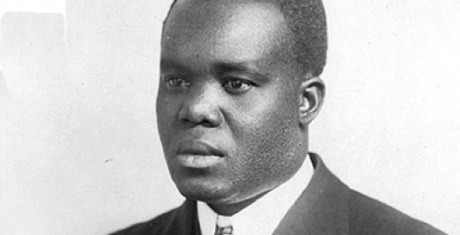Hubert Harrison
[A Tribute]
Keep Alive the Struggles and Memory of this Giant of Black History. This Week Marks the 131st Anniversary of His Birth
Hubert H. Harrison (1883-1927) is one of the truly important figures of twentieth-century history.
A brilliant writer, orator, educator, critic, and political activist, he was described by the historian Joel A. Rogers, in World’s Great Men of Color as “the foremost Afro-American intellect of his time.” This extraordinary praise came amid chapters on Booker T. Washington, W. E. B. Du Bois, William Monroe Trotter, and Marcus Garvey.
Rogers adds that “No one worked more seriously and indefatigably to enlighten” others and “none of the Afro-American leaders of his time had a saner and more effective program.”
Labor and civil rights leader A. Philip Randolph described Harrison as “the father of Harlem Radicalism.” Harrison’s friend and pallbearer, Arthur Schomburg, fully aware of his popularity, eulogized to the thousands attending Harrison’s Harlem funeral that he was also “ahead of his time.”
Born in St. Croix, Danish West Indies, on April 27, 1883, to a Bajan mother and a Crucian father, Harrison arrived in New York as a seventeen-year-old orphan in 1900. He made his mark in the United States by struggling against class and racial oppression, by helping to create a remarkably rich and vibrant intellectual life among African Americans and by working for the enlightened development of the lives of those he affectionately referred to as “the common people.”
He consistently emphasized the need for working class people to develop class-consciousness; for “Negroes” to develop race consciousness, self-reliance, and self-respect; and for all those he reached to challenge white supremacy and develop an internationalist spirit and modern, scientific, critical, and independent thought as a means toward liberation.
A self-described “radical internationalist,” Harrison was extremely well-versed in history and events in Africa, the Caribbean, Asia, the Mideast, the Americas, and Europe and he wrote voluminously and lectured indoors and out as a pioneering soapbox orator on these topics. More than any other political leader of his era, he combined class-consciousness and anti-white supremacist race consciousness in a coherent political radicalism.
He opposed capitalism and imperialism and maintained that white supremacy was central to capitalist rule in the United States. He emphasized that “politically, the Negro is the touchstone of the modern democratic idea”; that “as long as the Color Line exists, all the perfumed protestations of Democracy on the part of the white race” were “downright lying” and “the cant of ‘Democracy’” was “intended as dust in the eyes of white voters”; that true democracy and equality for “Negroes” implied “a revolution . . . startling even to think of,” and that “capitalist imperialism which mercilessly exploits the darker races for its own financial purposes is the enemy which we must combine to fight.”
Working from this theoretical framework, he was active with a wide variety of movements and organizations and played signal roles in the development of what were, up to that time, the largest class radical movement (socialism) and the largest race radical movement (the “New Negro”/Garvey movement) in U.S. history. His ideas on the centrality of the struggle against white supremacy anticipated the profound transformative power of the Civil Rights/Black Liberation struggles of the 1960s and his thoughts on “democracy in America” offer penetrating insights on the limitations and potential of America in the twenty-first century.
Harrison served as the foremost Black organizer, agitator, and theoretician in the Socialist Party of New York during its 1912 heyday; he founded the first organization (the Liberty League) and the first newspaper (The Voice) of the militant, World War I-era “New Negro” movement; edited The New Negro: A Monthly Magazine of a Different Sort (“intended as an organ of the international consciousness of the darker races — especially of the Negro race”) in 1919; wrote When Africa Awakes: The “Inside Story” of the Stirrings and Strivings of the New Negro in the Western World'” in 1920; and he served as the editor of the Negro World and principal radical influence on the Garvey movement during its radical high point in 1920.
His views on race and class profoundly influenced a generation of “New Negro” militants including the class radical A. Philip Randolph and the race radical Marcus Garvey. Considered more race conscious than Randolph and more class conscious than Garvey, Harrison is the key link in the ideological unity of the two great trends of the Black Liberation Movement — the labor and civil rights trend associated with Martin Luther King, Jr., and the race and nationalist trend associated with Malcolm X. (Randolph and Garvey were, respectively, the direct links to King marching on Washington, with Randolph at his side, and to Malcolm (whose father was a Garveyite preacher and whose mother wrote for the Negro World), speaking militantly and proudly on street corners in Harlem.
Harrison was not only a political radical, however. Rogers described him as an “Intellectual Giant and Free-Lance Educator,” whose contributions were wide-ranging, innovative, and influential. He was an immensely skilled and popular orator and educator who spoke and/or read six languages; a highly praised journalist, critic, and book reviewer (who reportedly started “the first regular book-review section known to Negro newspaperdom”); a pioneer Black activist in the freethought and birth control movements; and a bibliophile and library builder and popularizer who was an officer on the committee that helped develop the 135th Street Public Library into what has become known as the internationally famous Schomburg Center for Research in Black Culture.
People are encouraged to spread the word about Hubert Harrison and to Keep Alive the Struggles and Memory of this Giant of Black History.
About the author: Jeffrey B. Perry is an independent, working class scholar who was formally educated at Princeton, Harvard, Rutgers, and Columbia University. He was a long-time rank-and-file activist, elected union officer with Local 300, and editor for the National Postal Mail Handlers Union (div. of LIUNA, AFL-CIO).
Dr. Perry preserved and inventoried the Hubert H. Harrison Papers (now at Columbia University’s Rare Book and Manuscript Library) and is the editor of A Hubert Harrison Reader (Wesleyan University Press, 2001) and author of Hubert Harrison: The Voice of Harlem Radicalism, 1883-1918 (Columbia University Press, 2008).
He is currently working on volume two of the Hubert Harrison biography, editing Harrison’s writings for placement on Columbia University’s Rare Book and Manuscript Library webpage, and preparing a new edition of Harrison’s When Africa Awakes for Diasporic Africa Press.
Reviewer and reader comments on Hubert Harrison: The Voice of Harlem Radicalism, 1883-1918 and on A Hubert Harrison Reader are offered by Cornel West, Arnold Rampersad, Carole Boyce Davies, David Levering Lewis, Manning Marable, Amiri Baraka, Winston James, Joyce Moore Turner, Bruce A. Dixon, Wilson J. Moses, LaShawn Harris, David Roediger, Komozi Woodard, Bill Fletcher Jr., Christopher Phelps, Wayne Glasker, Christopher Phelps, Gary Okihiro, Portia James, Peniel Joseph, Charles Lumpkins, Abayomi Azikwe, Clarence Lang, Larry A. Greene, John Woodford, Maria Bibbs, Genevieve Ryan, Jonathan Grambling, Dave Zirin, Vanessa Bush, Yuri Kochiyama, Kevin “Rashid” Johnson, Ernie Allen, H. Nigel Thomas, Corey D.B. Walker, Michael N. Jagessar, Bryan D. Palmer, Herb Boyd, Brian Jones, John Alan, Venice Williams, Eric Anderson, Elena Pajaro Peres, Scott McLemee, Allen Ruff, George Tyson, Rhone Fraser, Susan Van Gelder, Gary Okihiro, Stephanie Hanlon, Sterling Johnson, Emily Jane Dawson, Ken Olende, Bret McCabe, Alberto Benvenuti, Gwen Edwards, Jonathan M. Hansen, Ian Kavuma, Matt Witt, Lloyd Dev, Peter Moore, Colin Benjamin, Shelley Ettinger, and Gene Bruskin. They give indication of Harrison’s importance and the extraordinary interest in his life.


















